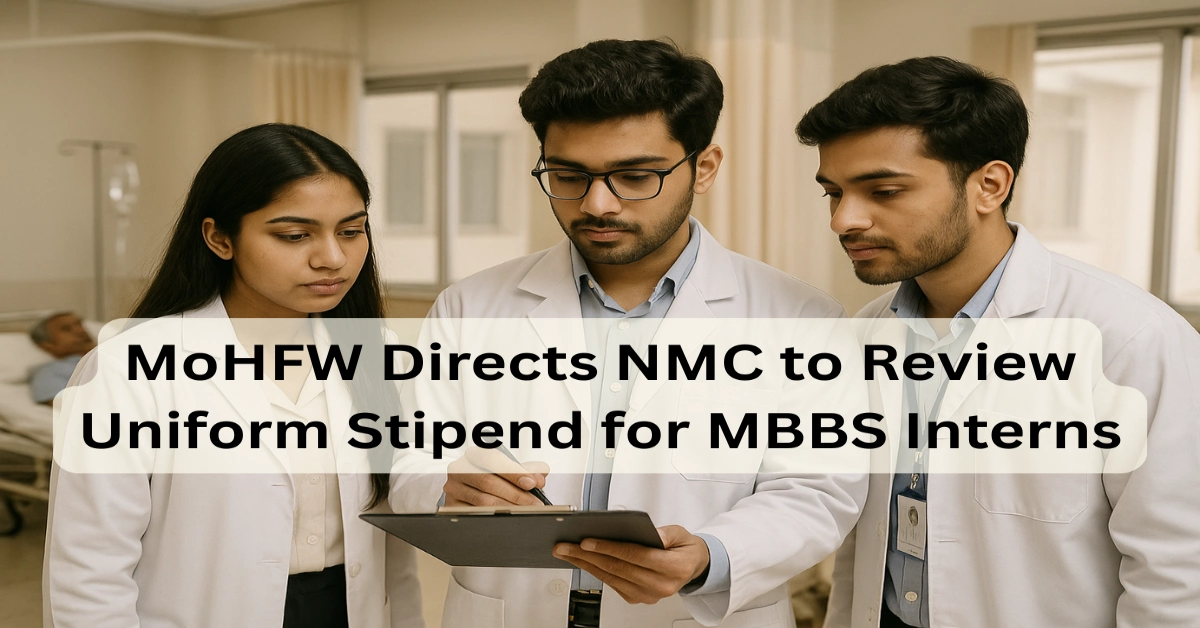The Ministry of Health and Family Welfare (MoHFW) has instructed the National Medical Commission (NMC) to examine the possibility of implementing a uniform stipend structure for MBBS interns across both government and private medical colleges. The direction aims to resolve the disparity in internship stipends, where many private medical colleges pay very low or sometimes pay no stipend at all.
The step has gained attention as it directly affects thousands of young doctors completing their Compulsory Rotating Medical Internship (CRMI) after MBBS.
What Led to This Development?
Current Regulations
- For PG Medical Students: Under the Post-Graduate Medical Education Regulations (PGMER), 2023, postgraduate students must receive a stipend equal to that paid in government medical colleges of the same State or UT.
- For MBBS Interns: Under the CRMI Regulations, 2021, the stipend is determined by the college or state authority, leading to large variations across institutions.
Resulting Issues
- Many private medical colleges offer very low stipends.
- Some institutions were found to not pay any stipend at all.
- MBBS interns often work full-time duties similar to junior doctors but lack financial support.
This uneven system created growing dissatisfaction among interns and student organisations.
The Health Ministry’s Directive to NMC
MoHFW has asked NMC to re-evaluate stipend rules for MBBS interns and consider aligning them with the principle used for PG medical students, where uniformity is maintained across the state.
Key Purpose of the Directive
- Increase fairness for MBBS interns.
- Reduce inconsistency between government and private institutions.
- Strengthen regulatory accountability on payment compliance.
Read Also: NEET UG 2025 MBBS Stipend: NMC Releases Latest Salary Details and Updated Rules
Why Uniform Stipend Matters
1. Fair Compensation for Workload
MBBS interns support OPD services, emergency departments, ward rounds, and patient management. A uniform stipend recognises their contribution.
2. Reduces Financial Stress
Many students take out education loans. Low or no stipend increases the burden during the internship.
3. Improves Morale and Training Quality
Fair pay improves motivation, which can contribute to better patient care and learning outcomes.
4. Promotes Equity Across Institutions
Around 60 per cent of MBBS seats in India are in private colleges. Equity in stipend is essential to prevent exploitation.
Possible Challenges in Implementation
| Challenge | Details |
|---|---|
| Funding Pressure on Private Colleges | Colleges may argue that increased stipends require fee restructuring. |
| State-Wise Cost Differences | States have different living costs, so a single amount nationwide may not fit all regions. |
| Monitoring and Compliance | Enforcement will require regular reporting and penalty mechanisms. |
| Resistance from Certain Institutions | Some private colleges may push back citing financial strain. |
Read Also: NMC Fee Guidelines: 50% Private Medical Seats at Govt College Fees
What Changes Are Expected Next?
- NMC may form a committee to review the CRMI 2021 rules.
- A draft amendment may be prepared proposing uniform stipend guidelines.
- Stakeholder consultations with States and medical colleges.
- Official Gazette Notification if the proposal is approved.
- Implementation phase, likely from the next internship cycle.
Impact on Students and Medical Education
Positive Impact
- More dignified training environment for young doctors.
- Reduced mental and financial stress.
- Improved professional respect and identity during internship.
System-Level Benefits
- Strengthens the credibility of NMC as a health education regulator.
- Promotes a more uniform clinical training ecosystem across India.
The directive to evaluate a uniform stipend for MBBS interns is a significant step toward bridging long-standing inequalities in India’s medical education system.
If implemented effectively, it will ensure fairer compensation, boost intern motivation, and promote ethical training standards.
However, careful policy planning and enforcement will be essential to ensure that both government and private medical colleges comply without making medical education less affordable.

